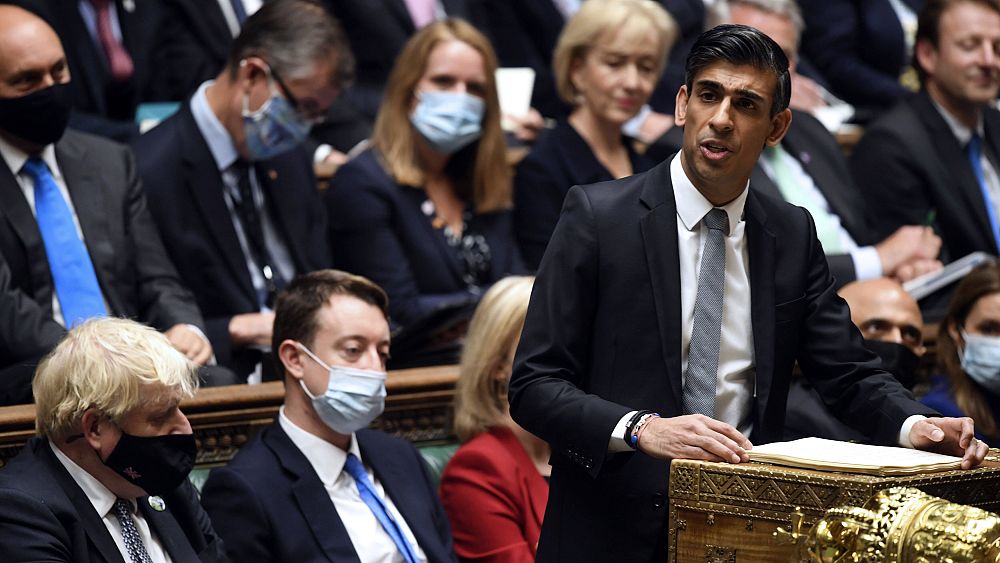
Britain’s finance minister on Wednesday unveiled a budget for a “post-COVID economy”, buoyed by a stronger than expected growth forecast for 2021, with a particular emphasis on public services and a promise to get the budget back on track.
Rishi Sunak’s latest budget relied on forecasts by the state-run Office for Budget Responsibility (OBR) that economic activity will return to pre-pandemic levels by early 2022 instead of mid-2022, thanks to the reopening of the economy and the success of the vaccines against COVID-19.
The Chancellor of the Exchequer said that “this budget is focused on investment and a more innovative and skilled economy,” and that total government spending would increase by 3.8% per year by 2024-2025.
However, the country is expected to see GDP growth slow to 6% in 2022. And inflation could peak “at nearly 5% next year, the highest rate in the country in three decades,” according to the OBR.
The recovery is showing signs of losing steam, hampered by labour shortages, bottlenecked supply chains and soaring energy prices, and high COVID-19 infections.
Tax increases
“With fuel prices at their highest in eight years, I am not prepared to put more pressure on families and small businesses,” Sunak said, before announcing that a planned fuel tax hike was being cancelled.
The government had already unveiled a £500 million (€592 million) fund to help disadvantaged households this winter.
But this budget contains “little new support to help people on the lowest incomes cope with spiralling energy bills”, said National Energy Action.
To finance these measures, the government had already agreed a rise in social security contributions, breaking a campaign promise, as well as an increase in business tax from 19% to 25%.
However, the Chancellor confirmed the reduction of a surcharge on banks to cushion the rise in corporation tax for the sector.
A major overhaul of alcohol taxes, which will increase for hard liquor but decrease notably for sparkling wine, was also announced.
With the opening of the COP26 climate conference in Glasgow just a few days away, environmental issues were given short shrift, with Sunak building on the £26 billion (€30.8 billion) of capital investment unveiled last week as part of his carbon neutrality strategy.
And while the finance minister announced an increase in taxes on long-haul flights, these are being lowered on short-haul flights, something that the railway workers’ union Aslef, in particular, is denouncing as sending “the wrong signals” before COP26.
‘Parallel universe’
Labour’s top finance official, Rachel Reeves, mocked the Chancellor, riposting after his announcement that “bankers who fly short and drink champagne will applaud this budget” but “struggling families will think Rishi Sunak is living in a parallel universe”.
“The climate emergency should have been the centrepiece of the budget guidelines (…) but Mr Sunak spent more time discussing taxes on cider,” Greenpeace said.
The NGO estimates that the Chancellor’s announcements cover only 5% of the spending needed to meet the country’s climate targets.
The Conservative-run government is also keen to get the UK’s public finances back on track, with the country’s deficit last year at a post-World War II high of nearly 15% of gross domestic product.
The Chancellor unveiled new fiscal rules “to keep this government on the path of disciplined responsibility”, aiming in particular for a budget surplus and a lower debt ratio within three years.
Sunak also announced a target to “reduce taxes before the end of this Parliament”. But the Chancellor’s room to be generous before the 2024 election “is likely to be limited by rising interest payments on the debt,” analysts at Pantheon Macroeconomics warned.
The Treasury had made a number of pre-announcements in previous days, including an increase in the minimum wage to £9.50 (€11.25) an hour and an end to the civil service pay freeze, as well as £6 billion (€7.1 billion) to help the under-pressure National Health Service (NHS) deal with delays in care caused by the pandemic.